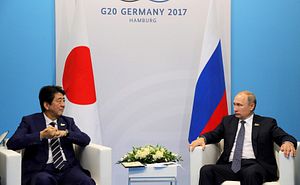Japanese and Russian officials met in Tokyo last week to try to make progress toward resolving the long-standing territorial dispute between the two countries. There was, from Japan’s perspective, one major problem: the same day as the talks, Russia began a military exercise on the disputed islands, known as the Southern Kurils in Russia and the Northern Territories in Japan. About 2,000 Russian troops were reported to be involved in the drills.
The diplomatic protest from Japan was swift. On February 7, the day after the vice ministerial-level talks, Japan’s foreign minister, Taro Kono, told a parliamentary committee: “This will lead to the increased armament of the four islands. It is incompatible with our country’s stance and is regrettable.”
Despite the complaints, the military exercise reinforces an overarching dynamic in the dispute: Russia controls the islands and the status quo clearly favors Moscow. Some close watchers of the Russia-Japan relationship believe 2018 is unlikely to be marked by any major breakthroughs, contrary to Japanese Prime Minister Shinzo Abe’s optimistic outlook.
In his first major policy speech of the year, Abe argued that Japan-Russia ties had “the most potential of any bilateral relationship.” The prime minister – who is expected to travel to Russia to meet with President Vladimir Putin in May – suggested they would make further progress toward joint economic projects on the disputed islands. “Furthermore, we will steadily carry through with the items agreed upon in Nagato one by one to resolve the territorial issue and conclude a Japan-Russia peace treaty,” Abe said at the opening of parliament on January 22.
But some are skeptical about the prospects of a comprehensive agreement on joint economic activities on the islands. It is hard to see Russia accommodating Japan’s demand for an underlying legal framework that doesn’t implicitly acknowledge Moscow’s claim to the territory, according to Temple University Japan associate professor James Brown, who specializes in Tokyo-Moscow relations.
“They’d have to come up with some special legal mechanism which would mean that it wasn’t contradictory to Japan’s claim – so that essentially means that it would have to take place outside of the normal framework of Russian law,” Brown said during a recent panel discussion hosted by his university. Allowing Japanese companies to operate on the islands outside of Russian law would be seen as a major concession from Moscow, Brown argued, and added that some Russian media had likened it to “Japan’s Trojan horse.”
“Clearly Russia wouldn’t recognize Japanese sovereignty but they would be giving Japan, it would seem, a foothold onto the islands, which could subsequently be used for perhaps pushing for something more favorable,” Brown said.
Anna Kireeva, an associate professor at the Moscow State Institute of International Relations, said reaching consensus on the legal framework would be “tricky.” Speaking on the same panel as Brown, Kireeva agreed that Russia was “highly unlikely to agree on anything not on Russian jurisdiction.”
But she said she saw potential for greater security and political cooperation between the two countries. In March 2017, Japan and Russia held the first 2+2 meeting of defense and foreign ministers since the dialogue was suspended over Moscow’s annexation of Crimea. A range of contacts are planned in 2018, including a meeting of the foreign ministers in Japan in the spring, paving the way for Abe’s planned visit to Russia in May.
This year also marks a public diplomacy initiative known as “Japan Year in Russia” and “Russia Year in Japan,” which is aimed at boosting cross-cultural links. “A huge task that Russia needs to do,” suggested Kireeva, “is improve Russia’s image in Japan, which is rather negative I should say.”
Still, broader security issues may hamper progress. Japan and Russia have differences on how to respond to North Korea’s nuclear weapons program, with Moscow highly suspicious of U.S. allies in the region boosting their missile defense systems. In this context, Japan’s decision to proceed with Aegis Ashore installations is being cited by Russia as an impediment to cooperation on other issues. Russian Ministry of Foreign Affairs spokesperson Maria Zakharova issued a stern warning in late December: “Actions like these are in direct contradiction to the priority of building military and political trust between Russia and Japan, and, unfortunately, will impact in a negative way on the whole atmosphere in bilateral relations, including negotiations over the peace treaty problem.”
It remains to be seen whether Abe and Putin can find a way through these differences to keep Japan-Russia relations on an upward trajectory. Some have speculated that Putin may have more room to move after the Russian presidential election in March. Brown, however, predicted otherwise: “Overall, despite Prime Minister Abe’s enormous enthusiasm … I think that 2018, like previous years, will feature a number of disappointments for the Japanese side.”

































